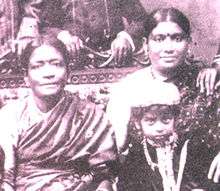Veenai Dhanammal
| Veenai Dhanammal | |
|---|---|
|
Veenai Dhanammal, circa mid-1930s | |
| Background information | |
| Born |
1867 Georgetown, Chennai |
| Genres | Indian classical music |
| Occupation(s) | Veenai player |
| Instruments | Veenai |
| Years active | 1880–1938 |
| Notable instruments | |
| Veenai | |
Veenai Dhanammal (Tamil: வீணை தனம்மாள்) (1867–1938) was a highly accomplished Carnatic musician, and the torchbearer of the school of Carnatic music that goes by her name. She was both a vocalist and a performer on the Saraswati veena. The prefix "Veenai" in her name is an indicator of her exceptional mastery of that instrument.

Early life and background
Dhanammal was born in George Town, Madras (now Chennai), into a family of professional musicians and dancers. Her grandmother Kamakshi was a reputed dancer, and her mother was a vocalist who trained under Subbaraya Sastri, the son of Syama Sastri of the Carnatic music composer trinity.
In addition to training by her family members, Dhanammal also learned from Walajapet Balakrishna Das ("Padam Baladas"), a blind musician who was a repository of the padams of Kshetrayya, and Satanur Pancanatha Iyer.
Career
"Regarding the veenai as an instrument complete and perfect in itself, she played it without plectrum, and often accompanied by her own singing. Her music is documented in a set of historical recordings. Her personal style, known as the Veenai Dhanammal bani, is still regarded as a yardstick in terms of adherence to traditional values and profoundity of music expression. Musicians, critics and composers attended her private recitals in Chennai. Her continuing impact is ascribed to the scope of her repertoire, knowledge and refinement. Many songs by leading composers like Narasimhacarlu, Mutialpet Ponnusvami, Tiruvottriyur Tyagayyar, and especially Dharmapuri Subbarayar were composed for, or inspired by, Dhanammal. These compositions, mainly javali and padam, have been preserved, taught, and published by her grandchildren, T. Sankaran, dancer T. Balasaraswati, T. Muktha, T. Brinda, and T. Viswanathan."[1]
A commemorative postage stamp on her was issued on 03-December-2010.[2]
References
- ↑ Pesch, Ludwig. The Illustrated Guide to South Indian Classical Music, New Delhi: Oxford University Press, 1999, p. 264.
- ↑ "Stamps - 2010". Department of Posts, Government of India. Retrieved 2 August 2013.
Sources
- SubbaRao, T. V. Studies in Indian Music, Asia Publishing House, London, 1962.
- Ayyangar, R. R. History of South Indian (Carnatic) Music, Published by the author, Madras, 1972.
- Pesch, Ludwig. The Illustrated Guide to South Indian Classical Music, New Delhi: Oxford University Press, 1999.
